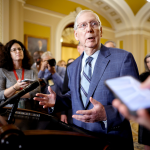Donald Trump’s return to the White House is signaling a sea change in American counterterrorism strategy. The pardons and commuted sentences of more than 1,500 people charged with or convicted of crimes during the failed January 6, 2021, insurrection included the leadership of the Proud Boys and Oath Keepers: violent, seditious extremists who were neck-deep in the political violence of the first Trump administration, which reached highs not seen since the restive late 1960s and 1970s.
At a time when the world’s richest man and sitting priests feel comfortable giving what appear to be Nazi salutes to packed audiences and television cameras, there is widespread apprehension about the reemergence of neo-Nazis, skinheads, and Trump-aligned street fighters who wreaked havoc throughout the United States from 2016 through 2020 before being brought to heel by the authorities after January 6. (The priest, Calvin Robinson, denied being a Nazi in a statement posted to Facebook.) Trump’s incoming liaison to the Department of Justice, Paul Ingrassia, was seen at a rally of Nick Fuentes supporters outside a Turning Point USA convention in 2024, according to The Intercept. (Ingrassia told The Intercept that he “walked past there for maybe five minutes out of curiosity…there was a lot of confusion, it was impossible to avoid if you were heading on foot in that direction.”) Trump’s administration appears to be purging seemingly disloyal officials in the Justice Department. Key officials in the National Security Division have been removed from their positions, including George Toscas, a deputy assistant attorney general who was a top official in the NSD’s counterintelligence section until a few weeks ago.
The apprehension is warranted.
After almost 20 years of obsessively focusing on Salafist jihadis, in 2021 under the Biden administration, agencies including the Department of Justice, Federal Bureau of Investigation, and Department of Homeland Security began to attend to the spiking threat of violent far-right extremism. The government had a comprehensive strategy to combat domestic terrorism, which was promptly removed from the White House’s web page last month. In several conversations, current and former federal law enforcement officials expressed alarm about the current trajectory.
“The key is the Domestic Intelligence Operations Guide. If they change that, you know [Trump’s nominee for FBI director, Kash] Patel will be able to shift domestic terrorism investigations away from the accelerationists and right-wing street fighters, and toward things like BLM and antifa,” said a current FBI agent, who spoke on condition of anonymity.
Data on domestic terrorism investigations indicate far-right extremists have been a rising threat to Americans over the past half decade, a topic I’ve been reporting on since 2017 and most recently for Vanity Fair last October. The rate of increase in domestic-terrorism-related cases is eye-popping: A February 2023 Government Accountability Office report found the FBI tallied 9,049 such cases in 2021, up from 5,557 in 2020; 4,092 such cases in 2019; and 3,714 in 2018. In 2017, the year of Unite the Right, there were 1,890 domestic-terrorism-related cases, nearly equivalent to the preceding four years. The GAO is precisely the sort of agency that could be targeted by the Trump administration to weed out “left wing” career employees. A similar accounting of domestic extremism will not happen under the current regime—or it will be distorted beyond all recognition to play up the imagined threat from the reactionary bogeymen of BLM and antifa.
There are other related extremism threats that could fall by the wayside, including the sprawling child exploitation and child-sexual-abuse-material (CSAM) distribution network 764, which I reported on last year for Wired. The 764 network is active in every US state and across Europe. Under President Joe Biden, the Justice Department viewed 764 as a “tier one” priority. Last year, the feds reportedly received 1,100 tips related to 764 and CSAM production.
Jason Blazakis, a former State Department official who served as director of the Counterterrorism Finance and Designations Office at the Bureau of Counterterrorism and now teaches at the Middlebury Institute of International Studies in Monterey, California, questioned the Trump administration’s commitment to seriously pursuing far-right terrorism.
“Will they focus their energies elsewhere? Sadly, the unfortunate response is they’ll likely focus on the individual Salafi jihadi organizations, Mexican drug cartels, and the Houthis as opposed to expending energy on the violent far right,” Blazakis said. “The arrests associated with January 6 led to a clear drop in extreme right-wing attacks in the United States, but with the pardons and releases, that very well could change and that emboldened feeling could well return.”
ERIC BARADAT/Getty Images.
Last month, Georgia representative Marjorie Taylor Greene introduced a bill that would designate antifa—the shorthand term for anti-fascist militants who the GOP has repeatedly attempted to portray as a structured organization rather than an ideology (by the FBI’s own assessment)—as a domestic terrorist group. The current appointee to run the National Counterterrorism Center, former Green Beret Joe Kent, has also urged the FBI to target “antifa and cartels” and employed a Proud Boy as a campaign consultant during his failed 2022 campaign for a House of Representatives seat in Washington state.
“Tier-one priorities are political, and as priorities are defined by the new administration, there’ll be an effort to remove the focus on extreme right-wing groups and delegitimize any effort to tackle them,” said Terry Albury, a former FBI agent who was sentenced to four years in federal prison for leaking internal bureau documents to journalists at The Intercept, in a conversation with me this month.
In response to questions from Vanity Fair, the FBI’s press office stated that protecting the United States from terrorism is its foremost priority. “We will always use all our lawful authorities and resources to detect and prevent mass casualty attacks, threats to critical infrastructure, and other unlawful acts intended to harm others,” the bureau wrote in an emailed statement. “The FBI has been increasing our efforts to confront the 764 online network by providing training to personnel in all of our field offices and working closely with partners in the United States and overseas.”Vanity Fair has also reached out to the DOJ for comment.
Presumptive FBI director Patel, who promoted a song by the January 6 choir of insurrectionists and was either obscenely uninformed or untruthful when he claimed he was unaware that the group of inmates included individuals who assaulted police at the Capitol, was not asked—by Republicans or Democrats—about his approach to domestic terrorism or violent right-wing extremists at his January 30 confirmation hearing.
Patel’s 2023 book, Government Gangsters, includes a list of more than 50 current and former US government officials whom he describes as “members of the Executive Branch deep state” and a “dangerous threat to democracy.”
According to reporting by CNN, at least one person on that list took the precautionary measure of moving and concealing their new address prior to Patel’s presumptive confirmation as FBI director. Extremist groups like the Terrorgram Collective, which was designated as a foreign terrorist organization earlier this month in one of the last counterterrorism policy moves by Biden’s State Department, have circulated similar lists in recent years calling for the assassination of prominent individuals like politicians, bureaucrats, law enforcement officials, journalists, and others.
Mike German, a fellow at the Brennan Center who investigated violent skinheads and neo-Nazis as an undercover FBI agent in the 1990s, cautions that turning a blind eye to extremism because of political calculation is a dangerous game.
“What I hope Republicans realize, and some of them do, I think, based on their willingness to express concern about the scope of the January 6 pardons, is that these far-right militants are not necessarily supporters of the Republican Party or Trump,” German says. “They know that his agenda is not theirs, and it doesn’t surprise me that when the FBI looked at this young man who shot at President Trump [Thomas Matthew Crooks], they found [evidence to suggest] he was steeped in the same anti-immigrant cesspools as many of these far-right militants.”
Earlier this month, German, along with Beth Zasloff, published Policing White Supremacy: The Enemy Within (New Press), a strident warning about the prevalence of right-wing extremism within law enforcement agencies, and the justice system’s long history of alleged collusion with far-right organizations like the Ku Klux Klan, and more recently, the Proud Boys and the Oath Keepers. According to ABC News, by April 2021 at least 52 active or retired police officers, law enforcement agents, military personnel, or government service employees had been arrested for their alleged actions at the January 6 insurrection. The January 6 committee uncovered alarming evidence that there was sympathy toward the insurrectionists within the FBI’s workforce.
“You have a lot of sympathetic people like that in the FBI who have already bought into this program,” said German. “It’s part of our society, and unfortunately, there wasn’t an attempt after January 6 to seriously address it—and now, that small percentage of cops and agents are empowered.”
The White Lotus Season 3 Stares Into the Abyss
The Cancer Scammer Who Became “One of the Most Hated Women in Australia”





GIPHY App Key not set. Please check settings